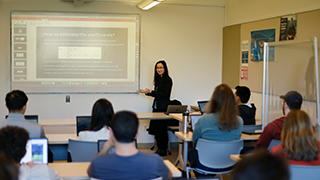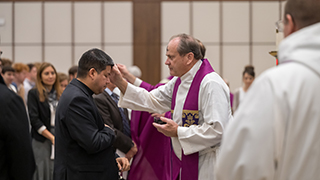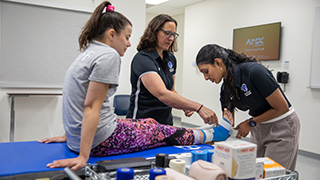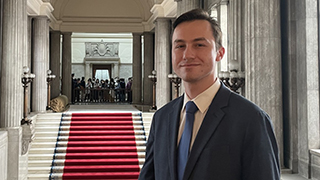Seton Hall Expands Graduate Program in Data Science, Enhances Engineering Focus
Tuesday, April 8, 2025
 Seton Hall University is pleased to announce the evolution of its Master of Science
in Data Science to the new Master of Science (M.S.) in Data Science and Engineering, effective Fall 2025.
Seton Hall University is pleased to announce the evolution of its Master of Science
in Data Science to the new Master of Science (M.S.) in Data Science and Engineering, effective Fall 2025.
Beyond its name, the shift introduces critical course enhancements that echo the skills today’s employers actively seek in tomorrow’s data scientists — a mix of foundational data science expertise and applied engineering problem-solving skills.
Data Engineering: The Core of Today’s Data-Driven World
At the heart of the refined curriculum is the introduction of Data Engineering as
a core requirement. This essential skill serves as the backbone of any data-driven
organization, enabling businesses to create the technical infrastructure needed to
manage vast amounts of data.
No matter the field, discipline or industry, every business looks at data to make decisions. Data engineering makes this possible by creating systems that gather, organize and prepare vast amounts of data. If data isn’t properly organized, data scientists can’t do their jobs effectively, explained Program Director and Professor Manfred Minimair, Ph.D., within the Department of Mathematics and Computer Science.
“A data scientist can’t build accurate models without well-structured data. Data engineering gives them the tools to organize, prepare the data and make sure it’s ready to be used,” commented Minimair. “Understanding how to build and manage data pipelines, and leverage cloud platforms like Amazon Web Services, gives data scientists a crucial edge in the job market.”
“Without this specialized training, graduates may find themselves missing out on the most in-demand roles in this rapidly evolving technology industry,” added Minimair.
Hands-On Experience Through Extended Capstone Project
In direct response to industry demand for practical experience, the capstone project
— taken during a student’s final year — will also be extended from one semester to
two. This adjustment offers students more time to engage in applied data science and
reinforce foundational industry skills such as Python, R, machine learning, coding
and SQL, acquired during their studies.
"An extended capstone offers students more flexibility in mastering their skills and gaining practical experience they will use daily in their careers. By the time they graduate, they’ll not only be able to apply their knowledge, but will have also already demonstrated a mastery of key credentials that employers actively recruit for," said Minimair.
For their capstone, students will continue to have two options: they can complete a research project that emphasizes collaborative, team-based problem-solving or, for those who wish to pursue a career in academia, craft a traditional research thesis.
With its strong focus on statistics, machine learning, cloud computing and programming, the program will maintain its emphasis on the use of cutting-edge technologies, including cloud computing platforms like Amazon Web Services (AWS) and programming languages.
Jonathan Farina, Ph.D., interim dean of the College of Arts and Sciences, pointed out, "Data now informs every industry, so the professionals who can understand, manage and innovate with it are in high demand across fields, including health, finance, insurance, technology and policy. The M.S. in Data Science and Engineering offers a careful balance between a comprehensive and flexible foundation and industry-specific applications and experience that will empower our career-ready graduates to meet these challenges and adapt with the future."
In-Demand Training with Hybrid Modality, Dual-Degree Opportunities
With the data science field projected for continued, rapid growth, the program’s evolution
positions graduates to stay ahead in an increasingly competitive job market. According
to the U.S. Bureau of Labor Statistics, employment in data scientist roles is expected
to grow by more than 35 percent over the next decade — much faster than the average
for all occupations.
A hybrid model that combines on-campus and online courses, the program can be completed in as little as 16 months, offering students the flexibility to balance their academic work and professional or personal commitments with both speed and ease.
Further, several dual-degree options with the M.S. program are also available for undergraduate students, allowing students pursuing studies in Computer Science, Mathematics, Applied Scientific Mathematics or Physics to build a versatile and interdisciplinary skillset in their chosen field.
Seton Hall’s proximity to the renowned technology sectors of New Jersey and New York City also provides students opportunities to take advantage of partnerships with industry giants like Barnes & Noble, Google, Facebook, Chase and Amazon. Additionally, lectures from industry leaders, hackathons and innovative projects through the Academy of Applied Analytics and Technology also offer opportunities for invaluable interdisciplinary collaboration, networking and career advancement that can set graduates apart in their field.
To learn more about the program, please visit M.S. in Data Science and Engineering or contact Associate Dean Michael Dooney at [email protected].
About the College of Arts and Sciences
Featuring innovative technology and varied opportunities for experiential learning
and collaborative research – all with a liberal arts foundation that fosters critical
and creative thinking – the College of Arts and Sciences is Seton Hall's largest and oldest college, with an eclectic array of programs for
undergraduate and graduate students alike. Students who graduate from the College
are poised for both personal fulfillment and success in the workplace, using their
professional and critical thinking skills to make a difference in their communities.
Categories: Education, Science and Technology






